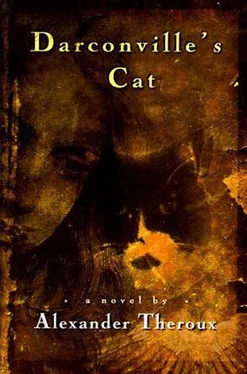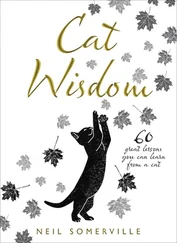“Excellent. You outdo yourself,” exclaimed Darconville. “And would you read those lines?”
“I’m sorry, sir. I’m afraid I won’t,” she replied, confidentially lowering her voice. “I do not read well enough for declamation.” She tilted her head. “Is that acceptable?”
Darconville was nodding but continued to listen intently long after the girl had finished speaking, as if struggling with an idea encountered, not in the classroom, but at the innermost of his being, one he was unable to comprehend — then, suddenly embarrassed, he looked up from the fanciful call of that mysterious girl in the right front row whose beautiful hair, like that of the Graces, enshrined the face he couldn’t see. Who then, asked Darconville quickly, would like to read the lines? He found a girl sitting directly in front of him, bent down, and smiled into her eyes.
“You are—?”
She was speechless.
It was Millette Snipes, a girl whose comic little face, perfectly round, looked like a midway balloon. She blushed, tapping one of those pencils-with-funheads, and with a farm-bright smile looked up with huge oval eyes that told instantly just how deeply she’d been smitten with love for her teacher.
“Shall I thay the whole poem, thir?” she asked, brushing aside a cinnamon curl that had stuck to her nose.
A wave of giggles broke over the class, until Darconville, soberly, tapped the desk once with his pointer like Orbilius plagosus . Then Scarlet Foxwell, her eye inset with something of a humorful character, leaned over to show her where to begin, but not before glancing back at DeDonda Umpton and Elsie Magoun who were both pinching their noses to keep from exploding with laughter.
Then Millette Snipes, her elbows akimbo, her book high, spoke in a voice from the family Cricetidae.
”No — yet thtill thteadfatht, thtill unchangeable,
Pillowed upon my fair love’th ripening breatht,
To feel forever itth thoft fall and thwell,
Awake forever in a thweet unretht—”
“Crisper, child,” said Darconville.
Inevitably, she spoke louder.
”Thtill, thtill to hear her tender-taken breath,
And tho live ever — or elthe thwoon to death.”
The girl tenderly pressed the open book to her bosom and looked up soulfully, her wopsical eyes moist and glowing. Darconville thanked her.
“Very good. Now, the poet here, as Miss Uprightly earlier pointed out, aspires to the star’s steadfastness but, you see, not at the cost of hermit-like loneliness. He is in a state of suspicion about what must be sacrificed in the pursuit of the Ideal. It is the problem, perhaps,” said Darconville, “of the paradoxical man who wants to move, say, but not migrate. Fanny Brawne, a coquette of sorts, was the woman Keats loved, and while she was not specifically the subject of the poem — it could be anyone — the poet wanted to live forever with whomever it was, such was his passion, or else swoon to death.”
“Thwoon in the thenthe of thuccumb?”
“Precisely, Miss—”
“Thnipeth.”
“The Romantic, you see,” said Darconville, “is a man of extremes.”
“It’th tho thimple,” said Millette Snipes, “a thad poem, but tho very very thimple.”
“The greatest lines in English poetry,” replied Darconville, “are always the simplest.” He lifted a lectern onto his desk and leaned forward on it. “I have something for you — call it, if you will, ‘The Principle of Trim.’ The poet, you see, is rather like the seagull who has a perfect process for desalting water, although no one can explain how it works: he baffles out of a given line, if he’s the enchanted metaphorsician we hope he is, that which otherwise would directly explain it.”
Darconville wanted to make this clear.
“The simple line seeks to outwit, not merely resist, the complexity of thought it noncommittally grows out of and, by definition, filters out the ideas it must nevertheless, to be great, always raise, do you see?”
As he felt the presence of that one girl near him, he listened distractedly to the voice that didn’t seem his. Who are you ? thought Darconville. Who are you ? He tried to concentrate his whole nature in one terrific effort to summon up, that he might dismiss it for once and all, the formidable magnetic mystery on his right that drew him so relentlessly off the subject.
“And therefore the greatest lines always imply the longest essays, discourses, metaphrases which the poet quite happily leaves to the agitation of critics, schoolmen, all those academic Morlocks who study the brain of a line after its face has come off in their hands.” Darconville looked around. “Do you want me to repeat that?” (cries of “yes, yes”)
Darconville thought for a moment. “The ring of a mighty bell,” he explained, “implies, logically, a technical if less melodic success in the shift and whirr of its gudgeons, a secondary sound that can be muffled only in proportion to the genius of the campanologist.”
Glycera Pentlock, throwing an exasperated glance at her neighbor, Martha Van Ramm, recklessly resumed scribbling away in her notebook. But Ailsa Cragg, chumbling the tip of her pen, gasped and blurted out, “What is a campanologist?”
“Use,” said Darconville, “your definitionary. It’s one of the last few pleasures left in life.”
Poteet Wilson looked aggravated. Wroberta Carter spun her pencil. And Barbara Celarent whispered a slang word which, though unbeknownst to her, was once held in common usage by the daughters of joy in fifth-century Babylon.
“Language,” continued Darconville, “often disguises thought. The successful poetic line, never discursive, is always thought extensively profound — and surely, upon the examination that is our burden, will be — but at its very essence it is the furthest thing from it. Beauty only implies truth, as fuit implies est . The poet doesn’t say so, however; the factophile does. Poetry is the more imperfect when the less simple. The nature of great poetry — a perfect art attempted by imperfect people— prevents the direct concern with truth and can only suggest by singing what it secretly shields by showing. The greater the simplicity stated the greater the complexity implied, you see?” Several girls put up their hands. “And putting aside for now the implications this has in the human personality, in affairs of the heart, know only that the reader is left to assume whether or not what the poet stated in Beauty he knew as Truth.”
A yawn was heard, followed by the jingling of some Scandinavian nail-jewelry.
“Bear with me? God alone is pure act, never in potency, whereas finite things ar.e metaphysically composed of act and potentiality. But, in poetry, Beauty is act, you might say, Truth the potency involved by inference in that act, and of course there follow many attendant questions that can be raised: will Beauty wane as Truth waxes? Is one the synonym, or the antonym, of the other? And what of the old idea that Beauty, meeting Truth, must always corrupt it — the Beauty that turns Truth, as Hamlet said, into a bawd? What are the implications — the essential question must be asked — of the Ideal?” A heavy inert apathy settled over the class. “We must consider the final lines of another poem of Keats, ‘Ode on a Grecian Urn.’ “
The students, exhaling sighs, actually seemed to decompress. It didn’t matter. Darconville, perhaps not even aware of it himself, was busy sorting out matters in the depths of his own mind.
“ ‘Beauty is Truth, Truth Beauty’: I call this Keats’s Comfort — he is saying his prayers and, embarrassingly, is overheard. It is a correct epistemological utterance, you might say,” continued Darconville, “made aesthetically incorrect at the very moment it is introduced into the poem. Beauty is Truth, Keats forgot, only if and when the didactician is there to say so by whatever means he can. Arguably, Beauty is Truth precisely when it does not say so, just as, turn about, a holy man disproves his holiness as soon as he asserts it. Ironically enough, then, this, the most famous line of Keats, while starkly simple — indeed, it is generally accepted as the classic example of such — denies exactly what a simple line must be valued for, asserting what should be implied, attesting to what it can’t. The line expresses what it does not embody — or, better, embodies what it has no right to express: a beautiful messenger appears delivering ugly news. It’s a paradox in the same way that—”
Читать дальше












